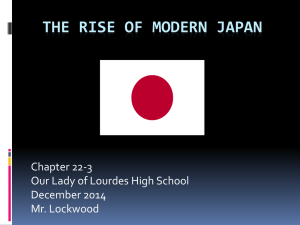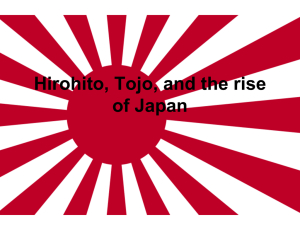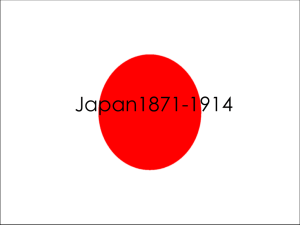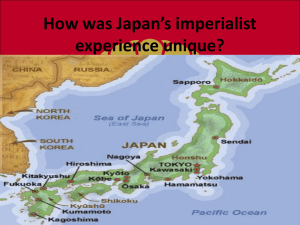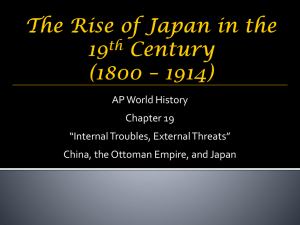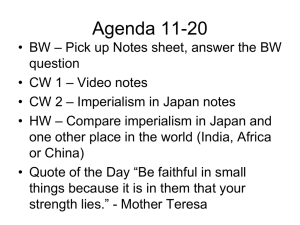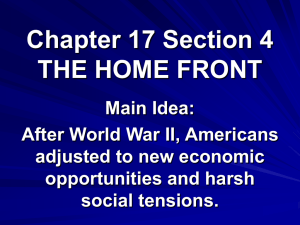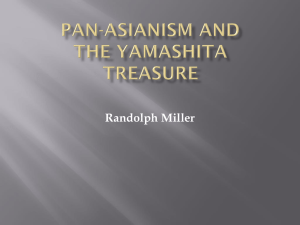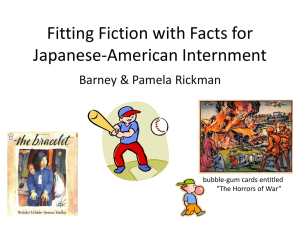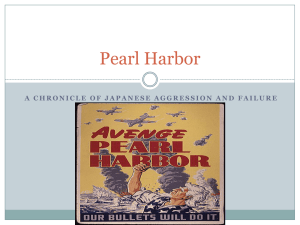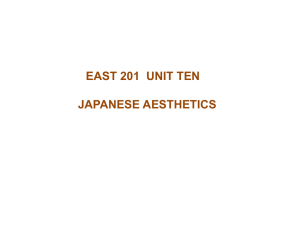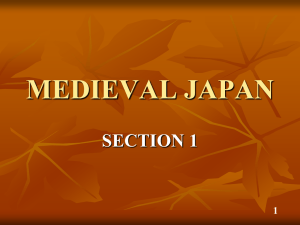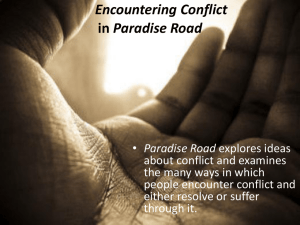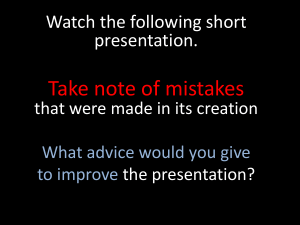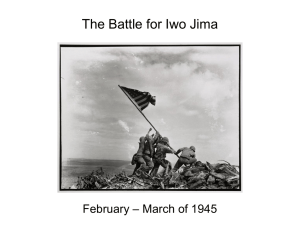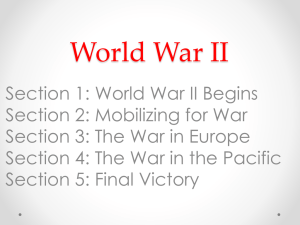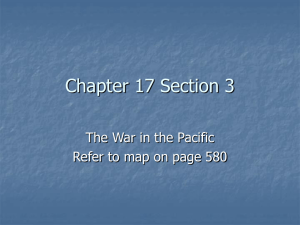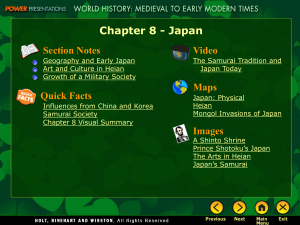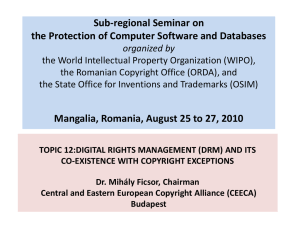The Effects of the Meiji Period: Japan*s Worldview
advertisement
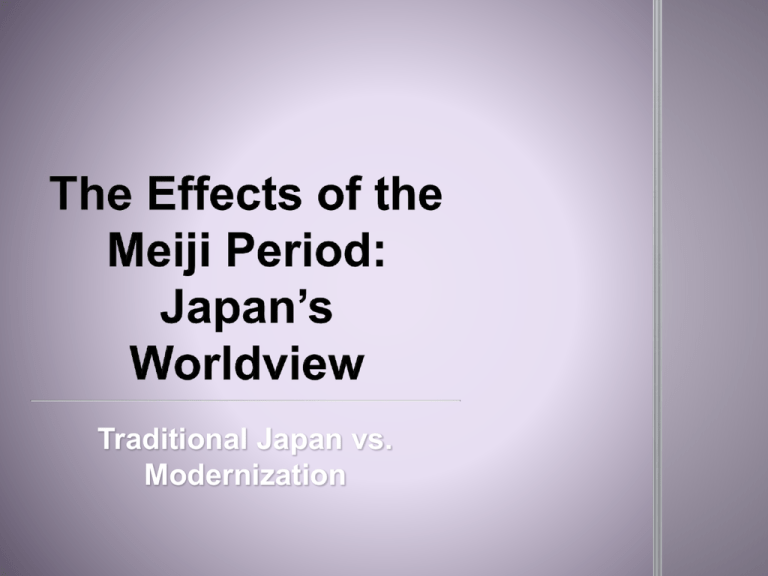
Traditional Japan vs. Modernization 8.1.6 – How did the changes resulting from adaptation affect Japan economically, politically and socially during the Meiji period? 8.1.6 – In what ways did changes resulting from isolation in the Edo period compare to changes resulting from adaptation in the Meiji period? 8.1.6 – What challenges emerged for the Japanese in maintaining traditional cultural aspects of their society while undergoing rapid change? 8.1.6 – How did Japan adapt to changes brought on by the transition from feudal to modern models of organization? Influential author, educator, and business entrepreneur Was born into a low-ranking samurai family Went on the Iwakura Mission Wanted American style democracy Learned English and Dutch Became authority on Western politics Owned a newspaper and was a supporter of women’s rights Wanted people to see change as positive http://upload.wikimedia.org/wikipedia /commons/thumb/1/16/FukuzawaYu kichi.jpg/200px-FukuzawaYukichi.jpg http://upload.wikimedia.org/wikipedia/commons/a/a7/10000_yen_note.JPG http://www.tourist-destinations.com/2011/06/kyoto-japan.html Based off of the German system The Japanese leaders wanted a strong cabinet and limited powers of parliament (not as democratic) They named this new government DAJOKAN, after a historical form of government in Japanese history. Japanese leaders realized that they needed to unify there country in order to build loyalty to the emperor and the central state They abolished the hierarchal social order of Japan (feudal system), which allowed people freedom…from all walks of life. This strengthened national unity – now all Japanese were obliged to be loyal to the Emperor and the new state of government, Check out the chart on page 207 of your textbook! Created in 1889 Was created because A) Most powerful European countries had constitutions B) Western countries would respect Japan if Japan adopted a Western-style constitution C) Japan wanted unity – so a constitution would cement that into society. Many Japanese couldn’t agree on what type of constitution they wanted However, the new constitution was similar to that of Germany, but…political change was accompanied by tradition belief that the emperor was a part of God in himself. The people of Japan thought that the constitution was a gift from the divine emperor, and were loyal – which helped unify Japan. Emperor’s powers were sacred and inviolable (not to be challenged or dishonoured) Freedom of speech and religion Rights to privacy, property, movement, and legal rights Imperial Diet (government) would have a House of Peers (royalty/nobility) and a House of Representatives (elected) Freedom of speech and freedom of the press (only lasted a few years) Political parties were discouraged Having different perspectives didn’t fit with the Japanese worldview Wanted to Japan to industrialize With the Unequal Treaties; Japan was not allowed to raise taxes on foreign goods or lower taxes on domestic goods Many domestic companies died out http://upload.wikimedia.org/wikipedia/commo ns/thumb/5/5c/JuEnDamaByodoinWP.png/22 0px-JuEnDamaByodoinWP.png Many government run industries were sold to private investors, which made many small, powerful companies Except for military Some were worried about this economic power, however it strengthened support for the Meiji state. One of these small companies was Mitsubishi… http://oldphotosjapan.com/images/117.jpg http://carmodel2011blog.info/wp-content/uploads/2012/03/2012-mitsubishi-lancer-0-1.jpg He was the Minister of Finance Brought capitalism to Japan Small business/farmers lost their jobs During his role as the Minister of Finance, industrial output increased By the end of the Meiji Era… Japan’s national income had doubled because of his policies http://media.web.britannica.com/eb-media/03/100903-004-4D654872.jpg Wanted to strong, centralized, obedient army Wanted to be a colonial power with strong leaders If had a strong army, could renegotiate the unequal treaties Modeled army after Germany, and navy after Britain Caused other countries to modernize THEIR armies and navies as well Wanted to preserve independence http://warandgame.files.wordpress.com/2010/05/tm027mainichi.jpg http://www.propa gandaposters.us/ sacrific.jpg Elementary was compulsory Could go to technical schools Had standardized education Taught strong morals, national identity, and loyalty to the Emperor Developed universities which were innovative Tokyo and Kyoto first universities created http://xstartover.proboards.com/index.cgi?board=information The adoption of Western ways and ideas Motto was: “Civilization and Enlightenment” Wanted to change unequal treaties by earning respect from Western nations by becoming a civilized country Created a newspaper so everyone could learn about the new and improved ideas Westerners were not tolerant of Japanese customs Japanese officials outlawed any behaviour that was found offensive to foreigners Japanese men used to wear loincloths in warm weather; were ordered to wear a shirt 1872 Japanese government outlawed tattooing Public bathing (Japanese ritual) was ordered to close or be modified (to not be seen) Imperial court etiquette changed Did not have to take off shoes Mats on palace floor changed to carpet Emperor learned to shake hands Used to never touch people Emperor learned about smiling to company European style food was served at receptions http://www.flickr.com/photos/aidan_jones/1234618279/ http://www.hot-tubs-spas-swimming-pools.com/renaissance_period_hot_tub_spa_culture_asia.htm There is no URL for the tattoo picture, it was taken from another teacher’s powerpoint… was not able to find it online! Japanese men encouraged to abandon kimonos (wear trousers and suit coats instead) 1870’s prominent Japanese men had cut their hair short and grew beards/moustaches Uniforms were changing to match Western style Emperor Meiji often war Western style uniform (he had ideals of modesty though… wore things until they fell apart http://en.wikipedia.org/wiki/Emperor_Meiji http://www.kamakurapens.com/Grant/Grant1.html Backlash a hostile reaction to a trend Deer Cry Pavillion built – European style building where Westerners were entertained European foods, Cuban cigars, card games, billiards French orchestras, operas, dances, etc Made Japanese mad, because they adopted these but were not getting the respect and Westerners were not willing to change the treaties Do you have any examples of this? http://www.dailyt ravelphotos.com /images/2009/09 1121_fenghuang _china_grandmo ther_grandchild_ baby_smiles_IM G_2387.jpg Japanese had gone through rapid change Had started to feel embarrassed about their traditions Japanese were proud and independent people who realized their traditions, customs, and beliefs were too important to lose Wanted to slow down Westernization “Western science, Japanese essence” became the new motto Japanese felt Western nations were unified because of a common religion Buddhism was discouraged, Shinto, the way of the gods, became the official religion Buddhism eventually became accepted as well A fad for Japanese things that the Westerners had Shows Japan had influenced the West as well Art was the main influence Started copying techniques Fans, kites, parasols, porcelain, kimonos and woodblock prints were popular collection items Were not able to renegotiate the unequal treaties Lobbyists started to express themselves (did not happen much before) Emperor Meiji croaked (1912) Leading generals and wife committed sepukku (ritual suicide) Some praised devotion, some thought it was stupid Japan’s militarism became too much, led to WWII when the two bombs were dropped (video later) http://www.youtube.com/watch?v=i4x7G_AOL8k (very sad, some disturbing pictures) Were dropped by the USA in 1945 Took Japan out of the war Was considered payback for Pearl Harbour Made a strong economy which led to prosperity and consumerism Have a huge influence on other countries around the world Are on the cutting edge with technology http://travelanthropist.com/wp-content/uploads/2011/10/japan.jpg Levin, Phyllis, Teddy Moline, and Patricia Redhead. Our Worldviews: Explore, understand, connect. Toronto: Nelson, 2007
